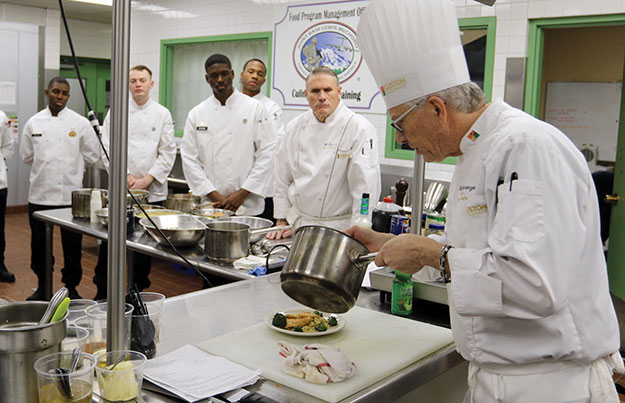Chef Mike Speranza has spent decades working in some of the best kitchens in America, ranging from restaurants and hotels to Pillsbury and General Mills. Speranza's lifetime of professional cooking allows him to teach culinary skills in a way that seems effortless and engaging.
Thanks to a new Army program initiative called Adopt an Installation, Speranza's students today are soldiers and airmen from Joint Base Lewis-McChord. Developed by the Joint Culinary Center of Excellence, the program partners installations with institutionally trained chefs who volunteer their time to train and mentor Army culinary personnel.
The training held with Speranza on JBLM is the first of its kind under the Adopt an Installation program.
 "I hope they can take the skills I've shown them and apply it to their everyday job; hopefully it makes their jobs easier," said Speranza, a certified executive chef. "Some of (the soldiers) have some really good skills, others are still learning, but everyone is interested in what they're doing."
"I hope they can take the skills I've shown them and apply it to their everyday job; hopefully it makes their jobs easier," said Speranza, a certified executive chef. "Some of (the soldiers) have some really good skills, others are still learning, but everyone is interested in what they're doing."
The training with Speranza was geared toward more junior culinary soldiers who may not be far removed from their Advanced Individual Training (AIT), and are directly involved with preparing food at their respective dining facilities (DFAC).
"All they know is Army, Army, Army ... and this chef brings in outside knowledge to expand their horizon," said Sgt. Maj. Amy Davis, Food Service Sergeant Major, 7th Infantry Division. "Whatever ideas they get from the chefs, they can take back to their DFAC, and start incorporating it."
One of the main focuses of Speranza's training was how to do more with the ingredients and techniques the soldiers already employ. A simple soup or gravy base was used to produce more advanced meals with only a few more steps, and instant coffee was mixed into a dish to add a unique flavor.
Speranza also demonstrated a handful of professional techniques he has used throughout his decades-long career: quickly and safely cutting produce while minimizing waste, keeping a knife suitably sharp, and plating food with a restaurant-quality flare.
After the instruction period, students set to work in pairs cooking a dish based on one of Speranza's recipes. Throughout the hands-on training, the executive chef offered further instruction and professional critiques.
"He showed us a lot," said Spc. Shakia Holder, a culinary specialist with 508th Military Police Battalion (Detention), 42nd Military Police Brigade. "Just from one chicken or beef base, we can make so many different things."
Holder works at the DFAC inside the Northwestern Joint Regional Corrections Facility, and noted that her supervisors were interested in incorporating the ideas she learned from Speranza into their menus.
In addition to expanding the offerings at their DFACs, one of the other aims of Adopt an Installation is instilling a mindset of professional creativity in the soldiers that can pay dividends later in their careers.
"It helps broaden the spectrum of 92Gs; it shows them there's more than just cooking in a dining facility," said Sgt. Maj. Keysa Chambers, I Corps Chief Culinary Management NCO.
Chambers explained that the food service career map includes many other positions outside of working in a DFAC, including enlisted aid and working with culinary arts teams.
"It shows them the things they're doing in a dining facility can actually lead to a profession," said Chambers. "You can be a certified chef traveling around the world with the skills and techniques you learn (in the Army)."
The Adopt an Installation program relies on chefs volunteering their time, and is designed to enhance the skills of culinary soldiers with zero cost to the installation. Units interested in partnering with an institutionalized chef should contact their installation food program manager or the Joint Culinary Center of Excellence.





Read Comments